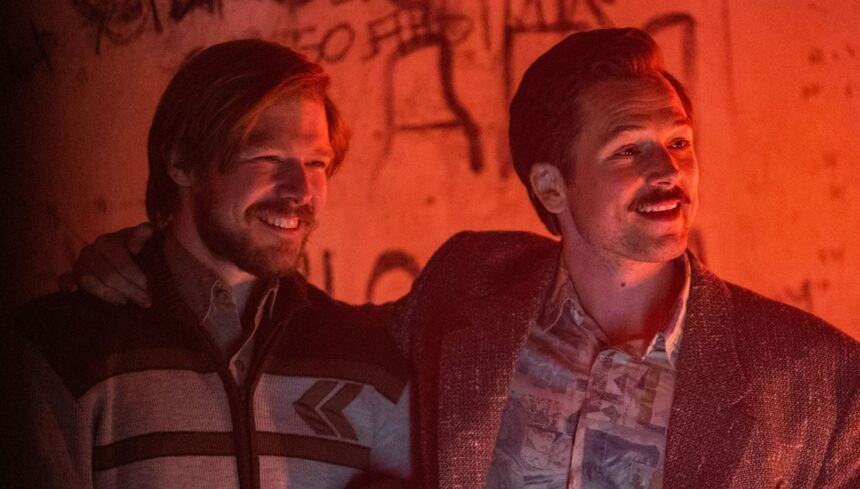SXSW 2023 Review: TETRIS, Taron Egerton Anchors Fun Cold War Thriller About Legal Contracts

When we think of video game movies these days, the first mental images that surface are inevitably garish, computer generated characters, over the top, cartoonish performances; maybe the occasional survival horror adaptation. Rarely does one imagine a procedural thriller about hastily written clauses in licensing contracts, but with Jon S. Baird’s Tetris that’s exactly what we get. One of the most popular video games of all time makes its big screen debut in this Cold War adventure written by Noah Pink (Genius) and starring Taron Egerton (Rocketman) and Nikita Efremov (Ballad About the Bomber).
Tetris was created in 1984 by a bored Russian coder named Alexei Pajitnov (Efremov), who passed it to his friends leading to its eventual underground success in the communist state among fellow salarymen. A few years later an adventurous licensor named Robert Stein (Toby Jones) managed to convince Pajitnov’s employer, Nikolai Belikov (Oleg Shtefanko), to sell him the rights to the game which led to its exposure at the Las Vegas Consumer Electronics Show where it grabbed the attention of video game software programmer, Henk Rogers (Egerton).
Rogers knew it was a hit, and immediately found a way to acquire the rights to sell the game in Japan, but he knew that it was destined for greatness beyond any other game he’d seen before, so he dreamed big. From here, the story gets complicated. These were the early, Wild West days of video games, arcade consoles were big business, desktop computers were also established, but 1988 was also near the dawn of the home console boom with Nintendo leading the charge, and there was money to be made through technology that wasn’t predicted by those early licensing contracts.
Tetris the film isn’t really about Tetris the game (thankfully). It’s about the journey from one talented man’s hobby to global domination with one of the most addictive games of all time. It’s a serpentine quest through red tape, corrupt communist officials, vicious licensors and licensees, and poorly written contracts, all while Rogers tries to acquire the rights and get Pajitnov his due.
It’s a Cold War thriller crossed with an Odd Couple buddy comedy, a strange mix that really shouldn’t work, but mostly does. Baird channels the chaotic energy that made Filth (2013) a standout to reimagine this relatively mundane story as something more. It’s a ballsy move in the current climate of video game adaptations that double as VFX extravaganzas to take one of the world’s most popular games and adapt its story in this way, but it’s also refreshing.
Egerton delivers that which he does best, an impossibly charismatic and charming performance that immediately gets the audience on his side, even though he’s essentially on a quest for financial success as the film opens. Not the most magnanimous of protagonists, but we see the stars in his eyes and want him to reach them. Pajitnov is a real revelation here, with an ability to convey both genuine fear of the communist machinery as well as a soft center that it seems only Egerton’s Henk can reach.
The energy on display in Tetris is kinetic, definitely working from the Filth template of pacing with an occasional splash of Guy Ritchie energy. Tetris does throw the audience the odd stylized bone of inserting 8-bit style transitions as well as Russian cover versions of popular American pop songs, which really work to connect to two very different cultures, but I do feel like there was room for further stylization. There is a climactic car chase which utilizes the 8-bit aesthetic to great effect that comes late in the film that had me wondering where this stylistic touch was in the previous 100 minutes, but better late than never, I suppose.
Tetris has a great energy and an interesting angle on the game’s breakout success, and the fact that it manages to make legal language and contract negotiations as gripping as they are here is a feather in Noah Pink’s cap. Though it doesn’t work one hundred percent of the time and we do get a bit in the weeds with the legal jargon from time to time, the lulls are few and far between, and the film’s two hour run time mostly breezes by. Fans of the game with little bit of imagination will definitely enjoy the story of how it made its way into the hands of the west against all odds, and they might learn a little something about the intricacies of licensing contracts along the way







